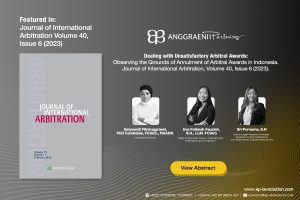Journal of International Arbitration Volume 40, Issue 6 : Dealing with Unsatisfactory Arbitral Awards: Observing the Grounds of Annulment of Arbitral Awards in Indonesia
In the intricate landscape of arbitration, the finality of an arbitral award is a cornerstone. Yet, in Indonesia’s legal system, this is not an incontrovertible truth. Anggraeni and Partners, with our esteemed managing partner Setyawati Fitrianggraeni, head of practice Eva Fatimah Fauziah, and senior legal research analyst Sri Purnama, delve into the complexities surrounding the annulment of arbitral awards, offering a compelling study featured in the Journal of International Arbitration Volume 40, Issue 6 (2023).
Abstract
Arbitration is often preferred because its award is final and binding. Nonetheless, this premise is not absolute. There are situations where the arbitral award can be set aside. In Indonesia, this procedure is locally known as annulment and requested to the District Court (or Pengadilan Negeri ‘PN’). Article 70 of Law No. 30 of 1999 on Arbitration and Alternative Dispute Resolution (‘AADR Law’) sets out three main grounds to request an annulment, i.e., forgery, concealment, and deception. However, the General Elucidation of the AADR Law suggests a non-exhaustive list of grounds by using the term ‘amongst others’. This vague phrase opens the grounds for interpretation by the Court, and parties seeking annulment can request grounds outside those expressly listed in the AADR Law. The most common examples include ultra petita, unfairness, and even Article 643 of the Reglement op de Rechtsvordering (RV), which have been previously invoked in annulment cases. The authors aim to scrutinize the prevailing laws and decisions regarding the annulment of the arbitral award and delve deeper into the grounds for arbitral award annulment requests in Indonesia from 2019-2022. Seventy cases were examined during this period. Out of seventy cases, twenty-nine cases were filed for an appeal to the Supreme Court, and two cases out of the twenty-nine cases sent for civil review. In total, fourteen cases were granted annulment, whereas twenty-two requests were held inadmissible (niet onvankelijke verklaard), and thirty-four requests were rejected.
Keywords
Arbitration, Grounds for Annulment, Grounds for Setting Aside, Arbitral Award, Award Annulment, Article 70 of Law Number 30 of 1999 on Arbitration and Alternative Dispute Resolution, Award Annulment in Indonesia, Award Annulment Process, Unsatisfactory Arbitral Award
Meet the Authors:
- Setyawati Fitrianggraeni: Managing Partner of Anggraeni and Partner, A PhD candidate and a luminary in the field, Fellow of the Chartered Institute of Arbitrators and Fellow of the Asian Institute of Alternative Dispute Resolution
- Eva Fatimah Fauziah: Head of International Arbitration and Litigation Practice Group and Head of Anggraeni and Partners Legal Lab. With a masterful grasp of international arbitration and litigation, Eva leads our practice with an innovative and informed approach.
- Sri Purnama, S.H.: As a junior legal research analyst, Sri brings a sharp and analytical perspective to the challenges of award annulment.
To gain deeper insights into this significant study, we invite you to read the full article
DISCLAIMER :
This disclaimer applies to the publication of articles by Anggraeni and Partners. By accessing or reading any articles published by Anggraeni and Partners, you acknowledge and agree to the terms of this disclaimer:
No Legal Advice: The articles published by Anggraeni and Partners are for informational purposes only and do not constitute legal advice. The information provided in the articles is not intended to create an attorney-client relationship between Anggraeni and Partners and the reader. The articles should not be relied upon as a substitute for seeking professional legal advice. For specific legal advice tailored to your individual circumstances, please consult a qualified attorney.
Accuracy and Completeness: Anggraeni and Partners strive to ensure the accuracy and completeness of the information presented in the articles. However, we do not warrant or guarantee the accuracy, currency, or completeness of the information. Laws and legal interpretations may vary, and the information in the articles may not be applicable to your jurisdiction or specific situation. Therefore, Anggraeni and Partners disclaim any liability for any errors or omissions in the articles.
No Endorsement: Any references or mentions of third-party organizations, products, services, or websites in the articles are for informational purposes only and do not constitute an endorsement or recommendation by Anggraeni and Partners. We do not assume responsibility for the accuracy, quality, or reliability of any third-party information or services mentioned in the articles.
No Liability: Anggraeni and Partners, its partners, attorneys, employees, or affiliates shall not be liable for any direct, indirect, incidental, consequential, or special damages arising out of or in connection with the use of the articles or reliance on any information contained therein. This includes but is not limited to, loss of data, loss of profits, or damages resulting from the use or inability to use the articles.
No Attorney-Client Relationship: Reading or accessing the articles does not establish an attorney-client relationship between Anggraeni and Partners and the reader. The information provided in the articles is general in nature and may not be applicable to your specific legal situation. Any communication with Anggraeni and Partners through the articles or any contact form on the website does not create an attorney-client relationship or establish confidentiality.
By accessing or reading the articles, you acknowledge that you have read, understood, and agreed to this disclaimer. If you do not agree with any part of this disclaimer, please refrain from accessing or reading the articles published by Anggraeni and Partners.
For further information, please contact:
P: 6221. 7278 7678, 72795001
H: +62 811 8800 427
Anggraeni and Partners, an Indonesian law practice with a worldwide vision, provides comprehensive legal solutions using forward-thinking strategies. We help clients manage legal risk and resolve disputes on admiralty and maritime law, complicated energy and commercial issues, arbitration and litigation, tortious claims handling, and cyber tech law.
S.F. Anggraeni
Managing Partner
Eva F Fauziah
Senior Associate Practice Group International Arbitration and Litigation and Head of Legal Lab.
Sri Purnama
Junior Legal Research Analyst

